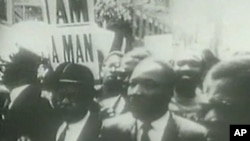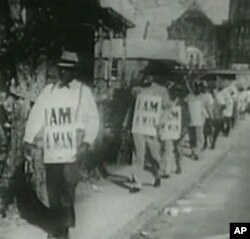One of Dr. Martin Luther King Jr.'s final campaigns was to support striking sanitation workers who wanted higher wages and union representation. Their plight was the reason the civil rights leader was in Memphis, Tennessee at the time of his assassination almost 42 years ago.
The strike lasted more than two months and ended soon after King's death. The civil rights leader's final days are being remembered during Black History Month, which is commemorated each February in the United States.
Back in 1968, the sanitation workers were angry about their meager salaries. They had no health insurance and were barred from being recognized as union workers. The strike divided the city along racial lines and came to symbolize the demands of African Americans for equality. Reverend Samuel "Billy" Kyles persuaded King to come to Memphis. He says the civil rights leader linked the plight of the sanitation workers to the larger cause of eliminating poverty.
"He came to Memphis to help the garbage workers and that is something we will always remember because he had such a compassion for the poor," says Kyles.
King and other civil rights leaders had launched "The Poor People's Campaign" a few months before he arrived in Memphis.
"It is my hope that powerful poor people will really mean having the ability and the aggressiveness to make the power structure of this nation says yes when they may be desirous of saying no," said King.
"The Poor People's Campaign" was the second phase of the civil rights movement. The goal was to build a nationwide coalition of poor people of all races and ethnic backgrounds and to push for jobs, equal wages and decent housing.
"We are tired of working full time jobs for part time income," King said at the time. "We are tired of living in run down dilapidated, rat-infested shacks and slums."
Kyles says King was planning another March on Washington to persuade the government to spend billions of dollars on poor people.
"I saw him stand on the front porch of a home in Quitman County, Mississippi and he saw little kids running around with their stomachs swollen," Kyles remembers. "You would have thought you were in a third world county. And he stood there and he wept. He said 'We can do better than this.'"
Reverend Frank McRae helped end the dispute between the city and the sanitation workers. He says King would be happy that his work achieved results. Nearly two weeks after King's death, the city agreed to wage increases and union representation. And the Memphis sanitation workers ended their strike.
"I think he would be pleased. That is the reason he came here," McRae says. "And those positive things were effected by primarily, if not exclusively, because of his death."
Community leaders say King's final campaign to bring about social justice will never be forgotten.





